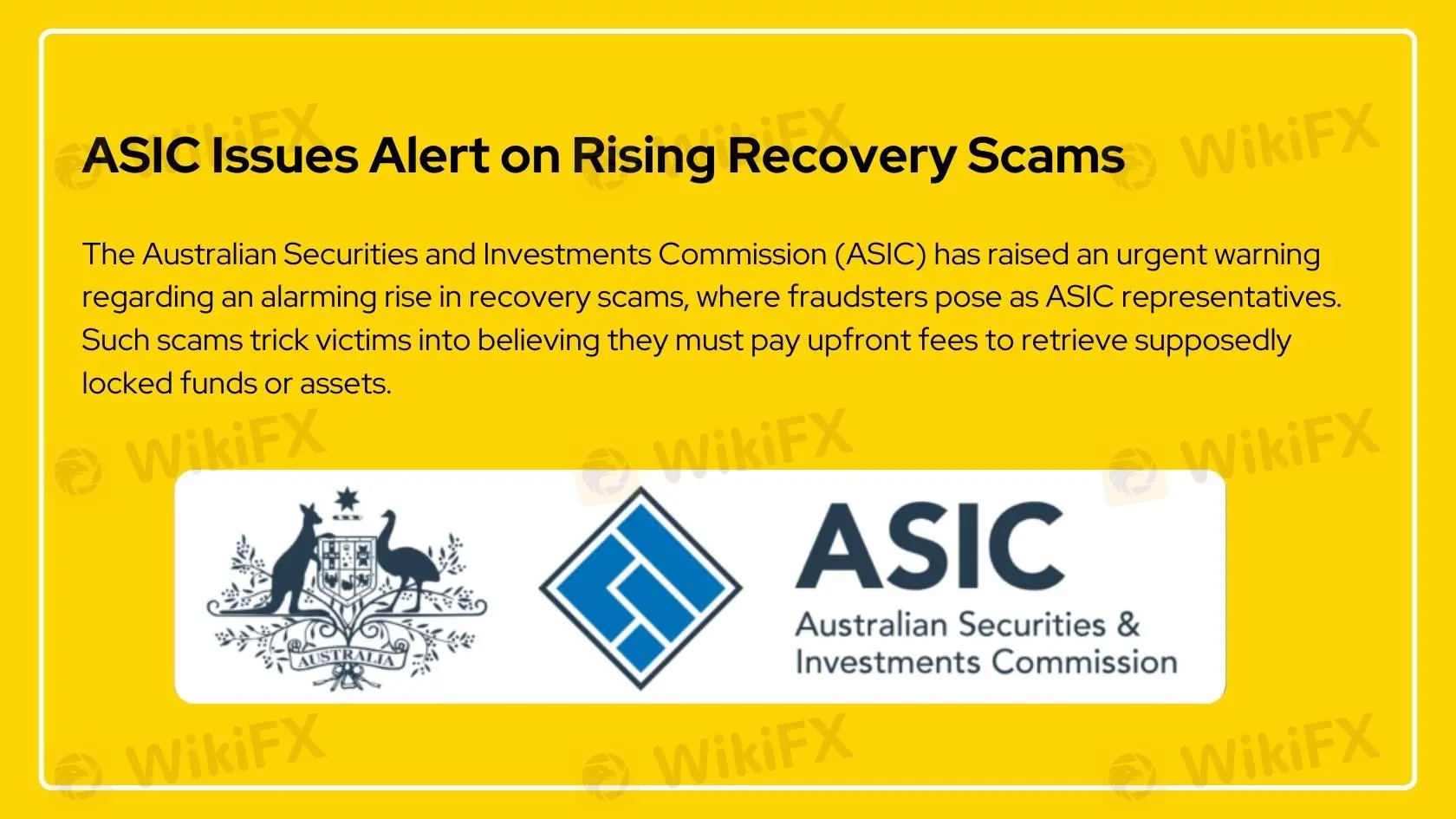简体中文
繁體中文
English
Pусский
日本語
ภาษาไทย
Tiếng Việt
Bahasa Indonesia
Español
हिन्दी
Filippiiniläinen
Français
Deutsch
Português
Türkçe
한국어
العربية
ASIC Issues Alert on Rising Recovery Scams
Abstract:The Australian Securities and Investments Commission (ASIC) has raised an urgent warning regarding an alarming rise in recovery scams, where fraudsters pose as ASIC representatives. Such scams trick victims into believing they must pay upfront fees to retrieve supposedly locked funds or assets.

Fraudulent Impersonation of ASIC
Scammers typically initiate contact via email, text messages, or phone calls, pretending to be from ASIC. In recent cases, scammers have specifically requested payments in US dollars to purportedly enable the release of investor funds. ASIC strongly clarifies it never charges fees for releasing assets or funds under any circumstances.
Recovery scams are particularly harmful because they target individuals already impacted by previous scams, exploiting their desperation to recover lost funds. ASIC emphasizes that investors should remain skeptical of anyone promising fund recovery in exchange for fees.
Recognizing and Avoiding Recovery Scams
ASIC emphasizes several key points to help investors spot these scams:
• No Payments Required: ASIC never demands payment in any currency—traditional or digital—including cryptocurrencies or stablecoins, to release locked funds or assets.
• Verifying Legitimacy: All official ASIC communications originate exclusively from email addresses ending in “@asic.gov.au”, and phone calls will only come from Australian numbers (country code +61).
• Unauthorized Use of ASIC Logo: Third-party entities are prohibited from using ASICs logo or claiming endorsement of services.
How to Respond if Contacted by Scammers
If you receive unsolicited communications claiming to be from ASIC:
• Immediately terminate the call or stop replying to emails or texts.
• Independently verify the contact by calling ASICs official number .
• Report suspicious activities to ASIC and Scamwatch.
Disclaimer:
The views in this article only represent the author's personal views, and do not constitute investment advice on this platform. This platform does not guarantee the accuracy, completeness and timeliness of the information in the article, and will not be liable for any loss caused by the use of or reliance on the information in the article.
Read more

U.S. Seizes $225M in Crypto Tied to Massive Scam Operation
U.S. authorities seized $225 million in crypto tied to large-scale scams, aiming to return funds to victims of crypto trading fraud.

New Zealand’s FMA Warns of Scammers Impersonating FCA and CySEC Officials
New Zealand’s FMA warns that scammers are impersonating regulators like the FCA and CySEC to lure investors through fake investment groups on chat apps.

No Regulation, Revoked Licence: Is Tradehall Safe to Use?
In the fast-growing world of online trading, safety and regulation must always come first. Traders need to choose brokers that are properly licensed and follow the rules. Sadly, not all brokers meet these standards, and Tradehall is a clear example of this.

Retirement Dreams Shattered: Don't Do This To Yourself!
Two retired Malaysian men have collectively lost more than RM1.14 million to fraudulent investment schemes promoted on social media platforms.
WikiFX Broker
Latest News
Tether Freezes $12.3 Million in USDT Over Money Laundering Concerns
MiCA Unlocks EU Crypto Market, but National Tensions Rise as Gemini and Coinbase Near Approval
Retirement Dreams Shattered: Don't Do This To Yourself!
Philippines Sets Southeast Asia’s First Crypto Regulatory Framework
EU Regulators Imposed Over €71M in Sanctions in 2024, ESMA Calls for Enforcement Convergence
FortuixAgent Review 2025: Is it Scam or Legit?
Danske Bank expects the European Central Bank to make its final interest rate cut in September.
No Regulation, Revoked Licence: Is Tradehall Safe to Use?
FXGT.com Trading Platform Review 2025
ATTENTION! Red Alert on These Brokers !
Currency Calculator


